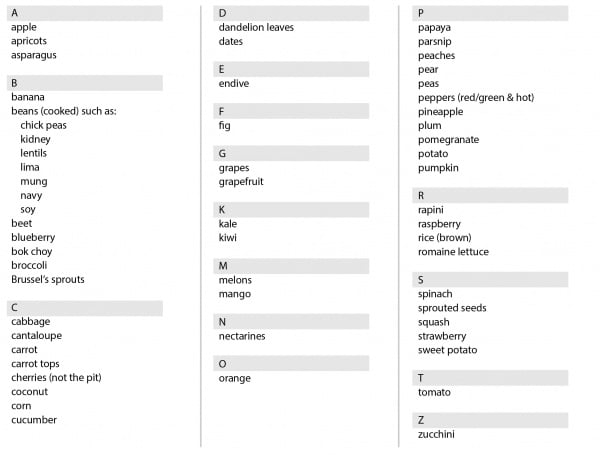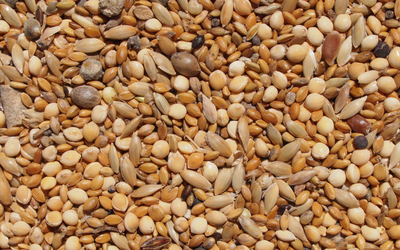How To Crush Up Super Hard Animal Food
General Data
Our knowledge of bird diet is constantly evolving, both from heightened awareness of the importance of nutrition and from increased inquiry into birds' dissimilar needs. As with all other animals, birds demand a proper remainder of carbohydrates, proteins, fat, vitamins, minerals and water. Different species of birds often crave dissimilar foods.
Should I exist concerned about what my finch eats?
Proper diet is unremarkably neglected and critically of import with pet birds. You should hash out your finch's nutritional needs with your veterinarian. Too often, owners assume they are feeding a proper diet to their finch when, in fact, they are not. Poor nutrition is a mutual cause of many health problems in birds. Birds' health depends on how well they are fed, so it is essential that bird owners are educated about what to feed their birds. Bird owners should stay in contact with their avian veterinarians to stay electric current on their birds' nutritional needs.
What practice finches consume in the wild?
Finches are generally seed eaters that eat a diverseness of plant seeds, especially grasses. Depending on the flavor, seed availability, insects and sure fruits, berries, and other vegetation volition constitute the bulk of a finch's diet during sure times of the twelvemonth.
What should I feed my finch?
Similar other birds, finches need to consume a balanced diet to stay healthy.
Wild finches eat a variety of seed types equally dissimilar plants come into season. Commercial seed mixes may incorporate ii-5 unlike kinds of seeds. However, these seeds tend to exist high-fat and nutrient-scarce and are not the same kinds of seeds that wild finches eat. If these seed mixes are fed as the only source of food, this could lead to sick health and a potentially shortened lifespan. When offered a mixture of seeds, finches tend to selectively eat only 1 or two of their favorite types of seed. Millet seed is often called preferentially. Owners commonly offer millet in the course of a millet spray or branch. While tasty, millet offers niggling nutrition and is devoid of vitamins and minerals. Often, owners volition also offer seed in the course of a dear stick containing seeds stuck together with dear on a stick of wood. Honey sticks, likewise, are delicious but are loftier in fat and scarce in nutrients. Other seed-based foods owners oft feed finches include molting foods, song foods, and conditioning foods. These products offering different combinations of more than seeds that finches like to consume but they have little nutritional value. Healthy molt, vibrant song, and strong body condition is best achieved by feeding a counterbalanced diet of commercially available pelleted food along with smaller amounts of fresh produce and seeds. Seeds should only be a pocket-sized role of a finch's nutrition, not the entire diet. The bulk of the diet should be commercially bachelor pelleted nutrient along with a smaller amount of fresh produce and seed.
"Healthy molt, vibrant song, and stiff body condition is best achieved by feeding a counterbalanced diet of commercially available pelleted food with smaller amounts of fresh produce and seed."
Every bit a guideline, about finches can exist maintained on no more than 1 level teaspoon per bird per mean solar day of varied types of seeds offered in a shallow dish. If there is more than ane finch in the muzzle, separate dishes should be used for each bird to ensure that all birds take equal access to food. In a flock situation, the feeding dish should be big plenty to allow several birds to consume at one fourth dimension.
There are several types of commercially formulated pelleted diets that come in diverse colors, shapes, and sizes and have been developed to meet all birds' nutritional needs. Pellets are the ideal nutrition for near birds. Seed-eating birds should be slowly weaned of seed-based diets and placed on pelleted diets. Pellets should ideally represent a minimum of seventy% of the bird's diet. Mature finches raised on seed diets may exist specially difficult to catechumen to a pelleted diet. Hand-raised babies are by and large the easiest to start on a pelleted diet.
Fruits and Vegetables
Fruits, vegetables and greens should account for approximately 20% of the daily diet. Pale vegetables, with high water composition, such equally iceberg lettuce or celery, offer very little nutritional value and should not exist offered.Avocado is reported to be potentially toxic and should never be fed to a bird. Fruits and vegetables must be washed thoroughly to remove chemicals earlier feeding. They should be cut into very small pieces appropriate to the size of the bird. It is not necessary to have the skin off. Fruits and vegetables should be offered in a separate dish. If your bird appears to develop a fancy for 1 nutrient item, reduce the book of this food. Terminate feeding that particular food item temporarily to encourage the bird to swallow other foods.
Water
Fresh clean water must be bachelor at all times. Depending on the quality of your tap water, you might consider using bottled water. Dishes should exist cleaned thoroughly every day with soap and h2o.
How exercise I convert my bird to a pelleted diet?
Converting seed-eating birds onto a formulated diet is not always easy. Initially, birds may not recognize pellets every bit food. Birds may be offered pellets in a bowl dissever from whatever other food, ideally, first thing in the forenoon, when they are hungriest. If they do not eat pellets right way, birds may exist slowly weaned off seeds over a period of a few weeks, while having pellets constantly available in a split dish. Pellets and seed should not be mixed together, as birds will simply pick out the seeds they like best. It may have days, weeks, or even months to modify a bird's diet. Pelleted food may exist crushed upwardly into a pulverization and sprinkled over moist table nutrient to get a bird to taste the pellets. Gradually, pellets may exist crushed less fine and mixed with smaller amounts of table nutrient until table food is no longer needed to get the bird to eat pellets. Modest birds, such as finches, should be weighed daily every bit they are converted over to pelleted diets to ensure that they are not losing large amounts of weight. Converting a finch to a predominantly pelleted diet tin can be a stressful time for both you and your finch. Consult your veterinarian if yous encounter whatsoever problems with this transition or with the wellness of your bird.
What nearly people food?
As a rule, any wholesome, nutritious nutrient that you and your family eat, your bird can too consume but in very pocket-sized quantities. Follow the general guidelines discussed above. Occassionally, some birds may enjoy a very tiny corporeality of lean cooked meat, fish, egg or cheese. Dairy products should exist consumed in moderation, equally birds are lactose-intolerant. Junk food such every bit chocolate, very salty foods (chips, pretzels, popcorn), also equally products containing caffeine and alcoholic beverages, may be toxic to birds and should not be offered.
Volition my bird have any different nutritional needs throughout its life?
Birds that are extremely young, stressed, injured, laying eggs or raising young may have sure requirements. At that place are specially formulated pelleted foods available for birds with specific nutritional requirements. Consult your veterinary regarding these situations.
Does my bird demand actress vitamins, minerals or amino acids?
Your veterinarian can help you assess your bird'south diet and its particular needs. In full general, birds that are eating pellets as the ground of their diets do not need supplements. Specific vitamins or minerals may be more of import at various times during a bird'due south life (e.yard., when a finch is laying eggs, calcium supplementation is required). Calcium supplements are bachelor if your finch is determined to exist deficient.
"In full general, birds that are eating pellets as the basis of their diets do not need supplements."
Powdered supplements are ofttimes regarded as more stable than water additives. If your veterinary recommends supplements for your finch, they should exist applied direct onto moist food. Placing these powders on seeds or dried foods is of little value, since it will ultimately end upward on the bottom of the nutrient dish as birds discard the shells.
Does my finch need gravel or grit?
Controversy continues over the need for gravel. Previously, it was believed that grit was necessary for the breakdown of food in the gizzard to assist in digestion. This is truthful for birds that ingest seeds whole, beat and all. However, many birds, including finches, remove the beat out before ingesting the seed kernel. Birds that eat this way do not need grit in their diet. When over-eaten, grit can cause alimentary canal obstruction and interfere with digestion.
What pointers should I remember about feeding my finch?
- Always monitor the amount of food eaten every day by each bird, particularly if birds are housed together.
- Offer fresh water every 24-hour interval.
- Offer fresh fruits and vegetables every day.
- Clean all nutrient and water dishes daily.
- If a bird rejects a food one mean solar day, it may accept information technology another day. Go on trying!
Some suggested nutrient items include:

Source: https://vcahospitals.com/know-your-pet/finches-feeding
Posted by: yudeppoccanot85.blogspot.com


0 Response to "How To Crush Up Super Hard Animal Food"
Post a Comment